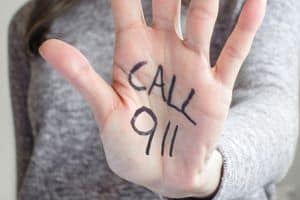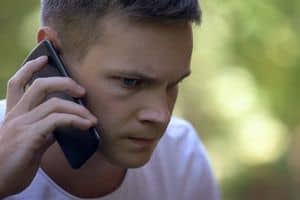For reasons that we won’t possibly try to guess, in some instances, you may wish to contact the local fire department or police department but remain anonymous. However, you know that most 911 calls are recorded, so is it really possible to call 911 anonymously?

You can call 911 anonymously. If the operator asks for your name, you do not have to tell them. That said, you should be willing to share information like your address if a fire or crime is occurring for your own safety.
In today’s article, we’ll discuss why 911 operators ask for as much information as they do, what info you should and shouldn’t provide, and if a 911 operator can trace your phone number.
Table of Contents
Can You Call 911 Anonymously?
We’ll jump right in and talk about whether it’s possible to call 911 anonymously. The answer, as we divulged before, is that yes, it is.
Now, don’t be mistaken. When you dial 911, whether due to a crime or because a fire has broken out on the premises, the operator is going to ask for your name.
That’s not all the information that they’ll ask for, but we’ll talk more about that in a little while.
What many people don’t realize is that you’re under no obligation to provide your name in most cases. You can simply say something like, “I wish to remain anonymous.”
The operator will jot that down in their notes, but that’ll be the end of it.
After all, if you’re dialing 911, it’s because there’s an emergency. The operator cannot waste precious time arguing with you about your willingness to share your name (or unwillingness, in your case).
All that said, if you’re calling 911 because you were involved in a crime, you should provide your name. It doesn’t necessarily have to be right then and there, but you should still do it.
Why Does the 911 Operator Ask for My Number?
After requesting your name, the 911 operator will next ask you for your phone number.
This is strange, you think. Doesn’t the fire dispatch or police dispatch unit have a caller ID that displays your number? It’s built into all smartphones these days.
Yes, they may have some form of caller ID. However, with the volume of calls received per day (according to one study, there are approximately 600,000 911 calls are made every day in the United States), it would be very difficult for the operator to trace which number belongs to whom.
It’s a lot easier to ask for your number so the operator can input it into the system and call you back at a later date and time. That’s really all there is to it.
What Other Information Does a 911 Operator Ask For?
As promised, let’s next go over the information that a 911 operator is going to ask for during the call.
Keep in mind that while you don’t have to provide all this information, the more info you can share, the better.

The reason the operator is asking for this information is not that you’re being implicated in a crime or anything of the sort. It’s simply the standard operating procedure.
Name
As we’ve been discussing throughout this entire article, a 911 operator is going to ask for your name.
However, it’s your right to remain anonymous if you so wish. Just remember that this will be added to the file made on the call.
And yes, every call gets a file. That happens whether you’re anonymous on the call or not.
Address
Next, the operator will ask for a physical address.
This can be the address you’re calling from, but it’s most helpful to provide the address where the fire or crime has taken place. Of course, if that’s the same address you’re calling from, then disregard.
Even if you’re trying to remain anonymous, you should still provide the address. The operator will dispatch the fire department or police department to the scene, but that’s impossible to do without an address.
If you don’t want to be there when the police or firefighters arrive–provided you haven’t committed any crimes, of course–then so be it, that’s your choice.
Just don’t withhold the address from the operator.
Nature of the Call
The operator will also ask you about the nature of the call.
Obviously, it’s an emergency, but what kind of emergency? Is your home on fire? Is someone in the house not breathing or even dead? Is someone severely injured but still conscious?
The police and fire departments will get to you, but they have to decide which cases take priority.
For example, if your home is on fire but everyone got out safely and there’s another home in the neighborhood that’s on fire with victims inside, the fire department will go to the latter house first.
Thus, the nature of the call is also information you want to readily share.
Can a 911 Operator Trace My Phone Number?
If you wish to truly remain anonymous when calling 911, that will apply to more than your name but your phone number as well.
Should you not provide your phone number, can the 911 operator trace it anyway?
Yes and no.
When you call 911 from a smartphone, your phone carrier sends data to a cellphone tower nearest the carrier.
That signal goes to the 911 center, where it’s then presented as phase one or phase two data.
Phase one is considered the more outdated means of location data of the two and isn’t widely used anymore. Phase two data can provide an address based on the closest datapoint.
In some cases, the address information is perfectly accurate, but in other cases, it isn’t. It all depends on the carrier strength, the number of cellphone towers around, and your phone’s coverage.
So to answer your question then, yes, a 911 operator can trace your phone, but it might not always be as accurate as television shows and movies make it seem.
Also, if you think you’ll ever need to call 911 in another state you should check out the article I wrote by following that link.
Of course, if you’d rather take no chances, you can always call from a landline or a phone booth if you can find any that still exist.
This article has proven that it is indeed possible to call 911 anonymously, at least if all you want is for your name to remain anonymous.
Even if you call and don’t say anything, a 911 operator can still get a general feel of your location through your phone pings.